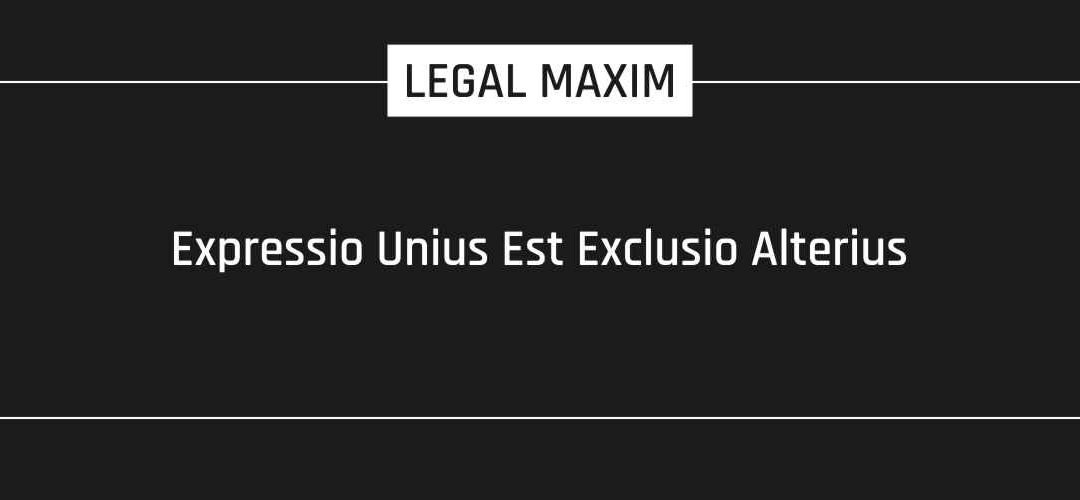Literal meaning
The explicit mention of one (thing) is the exclusion of another
Origin
Latin
Explanation
The legal maxim simply means that if one of the two possibilities of an event is talked about expressly, then the second possibility is kicked out by default. Since simultaneous occurrence of both possibilities of a single event is undesirable and not valid under the law. In order, to make a particular outcome valid and admissible, the other aspect has to be completely knocked out. It can also be understood as; when one or more things of a class are expressly mentioned others of the same class are excluded. The legal maxim forms the basis of the statutory provisions of law and states that inclusion of a specific category or class, excludes the other, completely. Since inclusion of two contradictory statements is violative of the principle of natural justice. It is also a prominent characteristic of law that an implied exclusion argument lies whenever there is reason to believe that if the legislature had meant to include a particular thing within the ambit of its legislation, it would have referred to that thing expressly. Because of this expectation, the legislature’s failure to mention the thing becomes grounds for inferring that it was deliberately excluded. Although there is no express exclusion, the exclusion is implied. The doctrine is useful not only in determining the extents of contracts but also plays an important role in the construction of statutes.
It can be interpreted as- Where certain persons or things are specified in the law, contract or will, an intention to exclude all others from its operation shall be inferred. In such a case, the reference to the assignment to a financial institution excludes assignment to any other entity. It is pertinent to note that, the express inclusion of one (maybe an act, a statute, or a provision), leads to exclusion of the other. This is a well-established condition, that express inclusion of one means implied exclusion of others.
Illustration
Let us assume that, initially, A and B enter into a written contract over a certain matter, then, later on, B cannot depute C on his behalf to execute the contract. Therefore, it can be observed that entering an express contract between the two parties A and B excludes any possibility of a third party, C, stepping into the contract during its execution.
Likewise, if a specific act is barred by the law of land, expressly, under any of its statutes, then its commission is impliedly illegal and punishable. For instance, smuggling is an illegal act and is expressly barred under the Indian Penal Code, any act in furtherance of the same act or any other act of this class is illegal and shall lead to harsh consequences.
Another example is that, the inclusion of an expressions like, ‘notwithstanding anything contained in this section’ in the provision bars the possibility of inclusion of any other condition.
Case laws
In R. r. Therms case, Le Dain J. applied the expressio unius principle of construction to s. 24 of the Charter. Subsection (2) of s. 24 provides that a court shall exclude evidence if its admission, having regard to all the circumstances, would bring the administration of justice into disrepute. In the decision appealed from, the majority in the Saskatchewan Court of Appeal had held that in addition to the duty to exclude evidence under s-s. (2), a court has the discretion to exclude evidence under s-s. (1) of s. 24 if it considers it “appropriate and just in the circumstances” to do so. Le Dain J., with whom five other members of the court concurred on the point, came to a contrary conclusion.
In the above-cited case law, it was iterated that, where one set of laws have taken dominance over the subject matter, and the law itself expressly declares the same, then, the inclusion of other law governing the same shall be excluded.
This Maxim has been written and submitted by Ms. Mansi Batra during her course of internship at B&B Associates LLP. Ms. Mansi is a third-year law student at the Fairfield Institute of Management and Technology, Kapashera, New Delhi.

very brief but helpfull
Thank you very lucid content